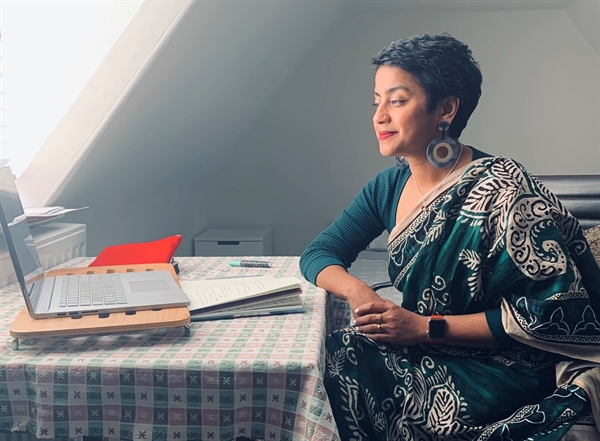A story about the green saree
*this blog talks about suicide and maybe emotional. Please apply self care.
Two weeks ago I dropped my baby girl off to University. She was excited to meet her new flat mates and start the journey of independence, new knowledge and friendships that will shape her into the woman she will become.
5 days ago I received a call from my girl telling me through tears in a broken voice that a young person in her friendship group had died by suicide. Words are not enough for the loss that young person’s family are going through. My heart shattered by this devastating news. I have reached out to their family. This loss is all of our loss.
My own maternal instinct was to drive 5 hours to go and see my girl right there and then. However that city is in lockdown. So doing the most natural thing a mum could do to sooth and to comfort with my arms around my baby has been made impossible by the pandemic. My girl is doing okay and I am very proud of her.
It is world mental health day next Saturday the 10th of October. Over the last 5 Sunday’s I have been recording conversation with women from my Saree community on Instagram. I called it the #GreenSareeForMentalHealth campaign. I interviewed 5 women I respect and admire; Vini Tandon Keni, Chinna Dua, Sunena Gupta, Nandini Sarkar-Shinde and Neha Sharma. We discussed mental health from our diverse perspectives. Little did I know that as I was building this awareness campaign focusing on positive mental health, in a parallel, not too distant world there was a young person struggling and losing hope. That for them carrying on was beginning to feel out of reach. Mental illness doesn’t kill, social stigma, self stigma and judgment does. If there is one wish I could have I would delete ‘shame’ from mental illness.
Losing the stigma starts with us. I’m convinced that my own mental health journey would have been very different if I’d been able to talk about it at critical stages of my life.
I’m a third generation British Bangladeshi. My Dada (grandad) came to UK in 1959, having served in the merchant navy for 20 years. My dad joined him when he was about twelve years old. They worked hard to provide food, shelter and education for the family back home. My dad lost his childhood, and 5 year ago he passed away at the age of 64, so he was robbed of his old age too. He was part of a generation of lonely young men who sacrificed everything to create a better future for their families.
I was born in house made of mud and straw. It was small and crowded. We had no electricity, no sanitation or running water. My grandmother reared chickens and sold eggs to buy our first bit of paddy field to grow rice in. My mum was 14 when she married my dad on one of his rare visits to Bangladesh. She was 15 when I was born, and my dad was back in England. We joined him in UK two years later.
So here you have a young couple, without role models, or the support of an extended family, doing their best to beat poverty, raise children, grow into a foreign community and have a sense of identity in an environment where nothing feels familiar especially the language. You can understand why preserving their values and culture through food, dress, religion, language, marriage customs and gender roles –was so important to them. They struggle, they adapt as much as they possibly can, they find a place in their migrated life that works for them and then it happens…the first child (me) hits teenage years.
(Parenting teenagers can often cause huge turmoil and distress. I have done it four times, I should know!)
I was an intelligent, ambitious, Bollywood-loving, dance-loving, religion-hopping, contradiction-filled, know-it-all teenager. Trouble and troubled. The one constant was my school routine, and some unforgettable teachers who made a lasting impression. Some were racist, motivating the activist in me. But others opened up my world and led me to believe that anything was possible.
I became skilled at managing multiple parallel lives: I was head girl and I bunked school, I was a grade A maths and science student, with ambitions of becoming an electronics engineer yet I knew I’d be lucky if I was allowed to attend college at all. I was my mother’s main support, yet I was self-harming.
As a parent now, I can say that I was every parent’s nightmare. Eventually I got involved with the wrong crowd and in desperation my parents decided it was time I was married. So, at 17, I was married to someone six years older who I met for the second time on the day of my wedding, in a country I didn’t recognise as home.
A couple of years later I gave birth to my first daughter and also got my first diagnosis of depression. I wanted to be a good mother, and I wanted to die. Life was very dark for a while. In my early 20s I tried to end my emotional pain twice. I’m so glad I failed and that I am here. Recovery is possible, it needs someone to hold your hope when you aren’t able to. At that time of despair I remember being held by my health visitor and my best friend from school.
I was really unhappy, ill and scared. I feared I might lose my child to poor parenting. For multiple reasons I left my marriage. I was a single parent and I was driven by my need to be a good mother. I knew I had to achieve financial freedom. Poverty as a single parent was not an option either. Like my dad, I too lost my childhood to work, parenting and mental illness.
I often wonder what difference a few good quality conversations would have made in my youth. Conversations like the ones I’ve since become skilled at because of my mental health first aid training. Fortunately, my story has a happy ending. My journey brings me here today towards this world mental health day. With my loving family by my side. I am lucky.
Most of us will have experienced some kind of mental health distress in our life. The more we, as individuals, share our personal experiences of the full spectrum of mental health, the less extraordinary they’ll seem. We need to own our mental health as a normal part of everyday. World Mental Health Day serves to remind the global community that mental ill health can affect any one of us, no matter where we were born, brought up, or live. It’s not about the things that happened to me it’s about the fact that I experienced depression and anxiety as a result. A common and natural human response.
I believe that each time we share our personal experience, the stigma of mental illness shrinks a little and if more people join in the telling, I have no doubt we can realise our dream of a healthier, more compassionate, stigma-free world and now more than ever we need compassion and kindness.
I am so grateful to my friends for their continued support over the years. I am beyond heartbroken that another young person has died by suicide. I stand in solidarity with anyone who has experienced a mental health issue and with anyone that has been touched by suicide.
Hold young people in your world close and squeeze them hard and remind them every day that they are loved.
For this year’s World Mental Health Day I invite you to move from having empathy to compassion - by taking action. Here are five things you can do…
- Have a conversation about mental health and explore what it means to you?
- Learn self care – work out your stress signature and your personal wellbeing toolkit.
- Check out and signpost everyone you know to the Every Mind Matters platform – education is key.
- Do the 20 minute online suicide prevention training – skilling up to be confident to talk is necessary
- Join me next week on world mental health day to show solidarity by posting a green picture with the
hashtag #GreenForMentalHealth or #GreenSareeForMentalHeath.
Everyone welcome to join in. And if you'd like to read more about how you can start to bring your whole self into the workplace, do please have a look at the MHFA Toolkit .





